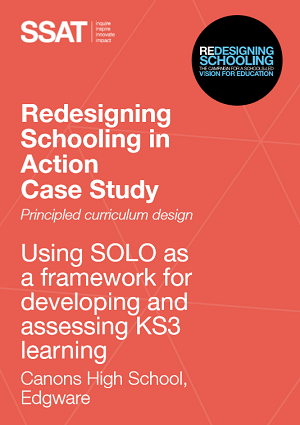This article is taken from an SSAT Redesigning Schooling in Action Case Study.
 How an Edgware school is improving teaching and learning at KS3 by focusing on the development of mastery – going beyond the memorising of facts to ensure students have a good understanding.
How an Edgware school is improving teaching and learning at KS3 by focusing on the development of mastery – going beyond the memorising of facts to ensure students have a good understanding.
Canons High School in Edgware was keen to develop the best possible replacement for the old system of levels used to report children’s attainment and progress.
So they set up a working party to conduct research into what other schools were doing to replace levels. Working party members visited a number of schools to see how they had developed and implemented alternative systems.
However, the approach they took deliberately avoided any imposed final product: Canon’s staff feedback was vital to develop a viable, sustainable tool to support learning in a way that suited the school’s context.
The result was Canons’ own assessment tool using SOLO (structure of observed learning outcome) taxonomy. This is a way of classifying learning outcomes in terms of their complexity, so as to assess the quality of students’ work.
The five stages to SOLO reflect understanding at progressively more challenging levels of learning. It also provides a common language intended to help teachers and students understand learning, regardless of the pedagogical approach being used.
The five stages reflect understanding at progressively more challenging levels of learning
The increasingly conceptual learning builds coherence, rigour and depth and promotes a mastery approach to the curriculum, reflecting the principled approaches to curriculum and assessment in the 2013/14 Redesigning Schooling pamphlets by Dylan Wiliam: Redesigning Schooling – 3: Principled curriculum design and Redesigning Schooling – 8: Principled assessment design.
Canons set up a pilot project with 78 students in year 7. Students were given baseline thresholds and CAT tested at the start of the pilot, and were taught and assessed across all subjects using the SOLO framework.
Data was collected at two separate points, December 2014 and February 2015. This allowed two separate analyses of data and an analysis of how students had progressed.
The approach sets out clear descriptions of what mastery looks like in each subject. For example, the six assessment frameworks for history based on the KS3 descriptors are designed around key skills: causation; diversity; significance; change and community; evidence and interpretation.
Departments had previously adapted their assessments to ensure that they could apply the SOLO framework and make the process of teacher assessment easier. The outcomes of the pilot were analysed in light of the assessment points and staff feedback obtained through a detailed questionnaire, as well as a CATs re-test.
Most feedback indicated that the process required some getting used to, but once the teachers got used to it they found it a positive experience. This approach also makes it easier to share good practice among and between departments to help less confident users.
Teaching and learning were enhanced by using the SOLO descriptors. As one teacher commented: ‘It allows you to consider whether a student is actually progressing and developing, compared to just steadily plodding along.’
‘It allows you to consider whether a student is actually progressing and developing, compared to just steadily plodding along’
Staff reported better understanding and description of the progress students were making, because they had to be considering progress and striving for high level functioning as opposed to just focusing on ticking boxes.
Students are required to strive for the extended abstract, which it makes it easy to identify what skills they have to display.
For most subjects analysed, a higher percentage of the students in the SOLO pilot group made expected progress or better than those in the non-pilot group.
Since September 2015, Canons has been extending the pilot to the whole school. By July 2016 all KS3 students will be using the new framework.
However, Canons staff are keen to emphasise that the way this approach to curriculum and assessment develops at the school will be based on the collaboration of staff and the lived experience of the students.
SSAT member? Download your free copy of the original case study.
Follow SSAT on Twitter: @SSAT
Visit Canon High School’s website.
